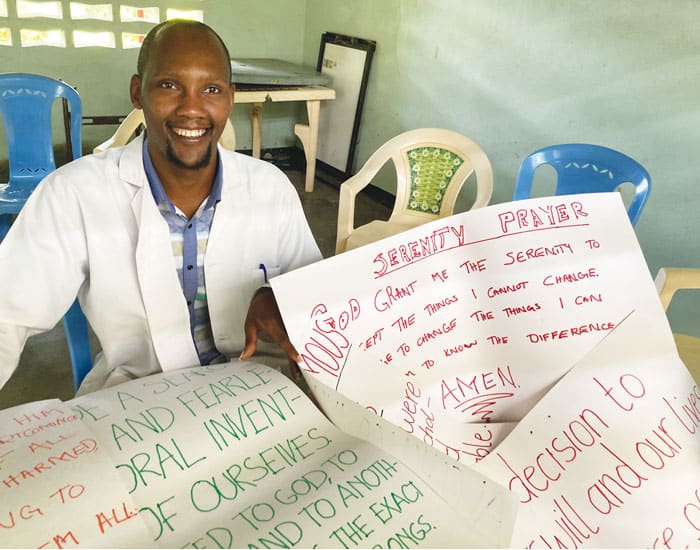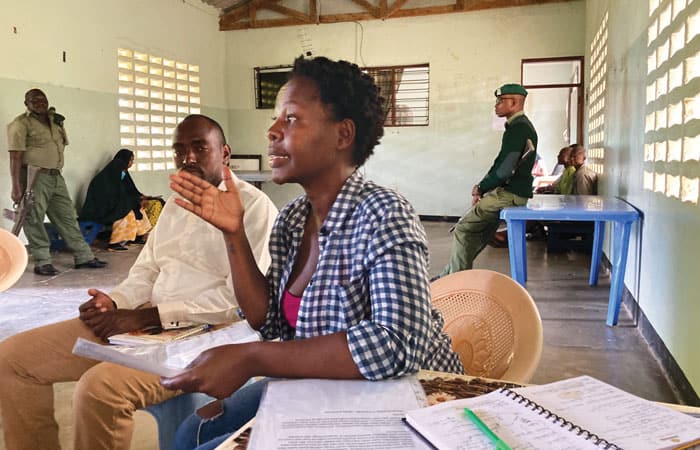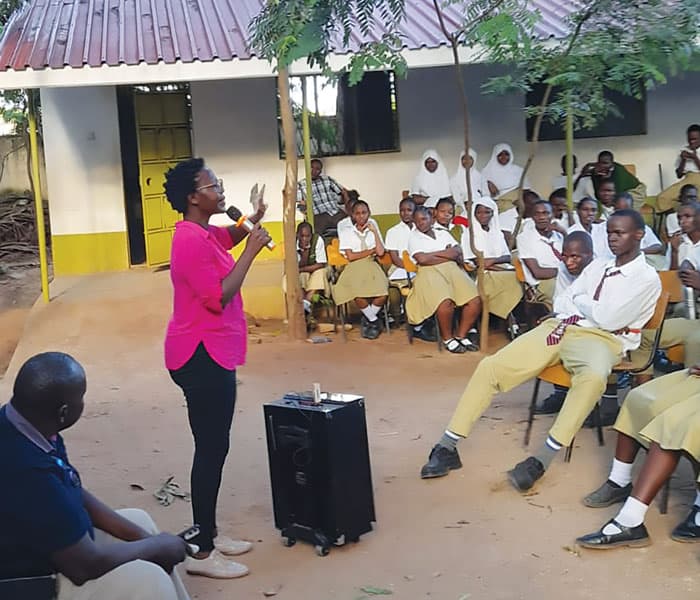Lay missioner’s ministry in Kenya helps people get and stay sober
A long, pot-holed road in Mombasa, Kenya, leads to the Port Reitz Mental Health and Substance Addiction Unit. It’s the gritty, harsh conclusion of many an addiction and mental illness journey — quite literally, the end of the line.
On Wednesdays, I take an Alcoholics Anonymous meeting there for a dozen or so patients. (All AA members in this article gave permission for their stories to be shared, and pseudonyms are being used.)
A few months ago, as we were about to get rolling, a young man walked in. His pressed white shirt glowed in the room’s grayish light. His shoes were new, his pants clean. He walked up to me with a small but joyous smile.
“Do you remember me, Megan?” he asked. As we shook hands, he said, “I’m Vincent, and I got sober here.” He told me he planned to come to Port Reitz every week to share the message that helped him get — and stay — sober. The minute he started sharing in Swahili, the patients attending the meeting sat up and leaned forward; their dark, sometimes desperate eyes locked in.
It was the first time anyone had come back to sit in one of these cracked plastic chairs after getting sober in one.
Vincent is true to his word. He comes back every week, sharing his experience, strength and hope — the message of AA — with those who sleep on the same cold cement he used to sleep on. Vincent carries the message with grace and simplicity.

Psychologist Titus Ngugi, who invited Maryknoll Lay Missioner Megan Hamilton to Port Reitz, helps patients create signs from AA readings to hang on the walls of the facility. (Courtesy of Megan Hamilton/Kenya)
Others in recovery join our meetings. Esther didn’t get sober at Port Reitz, but came to adeptly help run the meetings.
Arthur now hosts the Port Reitz meetings. Once a large-scale drug dealer, he was caught in the morass of gang life. People from his past still try to pull him back in. But he is committed to his recovery, and goes around town giving out information and explaining the AA program.
Like my hometown of Baltimore, Maryland, Mombasa is a port city: a bit scruffy, rakish with a rambunctious history. Like many port cities, it is rife with drugs, and there is always addiction.
When I first arrived two years ago, this city of 1.4 million had only one face-to-face AA meeting (others had gone online since the COVID-19 pandemic). We are now up to five in-person meetings. For comparison, when I got sober 31 years ago, Baltimore had 600 AA meetings a week.
Alcoholics Anonymous Kenya was established in 1971. At the East African AA Convention, which I helped Mombasa to host in November of 2022, a history of AA in Kenya was shared.
In Kenya, being an alcoholic or an addict is seen as the result of making poor lifestyle choices, being possessed by an evil spirit or the devil, or showing moral weakness. It is considered very shameful, and it brings shame on the whole family.

Volunteers speak about alcohol and substance abuse to Port Reitz patients and to inmates transported there from Shimo La Tewa Prison to attend the session. (Courtesy of Megan Hamilton/Kenya)
Awareness is needed about addiction, substance abuse disorder and recovery. People don’t know what it takes to get and stay sober. And even when patients leave rehab and go home, sometimes their family members say, “Great, now you’re cured. Celebrate with a beer!”
The shame makes it difficult for recovering alcoholics to advocate for what they need. People are too ashamed to tell anyone that they’re an alcoholic/addict and need to make time to attend meetings. Their families don’t understand the disease of addiction and how critical it is to maintain total abstinence from drugs and alcohol.
My ministry with AA began through my work with the Community-Based Health Care program of the Archdiocese of Mombasa, which was started in 1996 by the late Maryknoll Brother John Mullen. I had done some AA promotion in my previous international placements, in Albania with the Peace Corps and in Jamaica with Franciscan Mission. However, at first I wasn’t sure about making that the main focus of my mission here.
I felt sort of guilty about it. Was it service for my own selfcare?
My spiritual director, Maryknoll Father Larry Lewis, encouraged me. In his view, some of the best mission ministries combine what is most personally meaningful to us with doing good for others.

A public information session about addiction is held at a school in Ukunda, Kenya, with a presentation for 22 teachers followed by an assembly for the school’s 500 students. (Courtesy of Megan Hamilton/Kenya)
Although AA is nonsectarian and not restricted to any particular religious group, our connection to the Catholic Church in Mombasa has been a great asset. Sister Emily Jebiwott of the Sisters of St. Joseph of Tarbes, coordinator of the Community-Based Health Care program and its three centers, has been an expert advisor. Archbishop Martin Kivuva Musonde offers support, giving me a platform to share my work with AA. On the first Mondays of each month, I give an update to the archdiocesan staff. Priests and religious sisters I meet there often refer people.
Whether or not the people who come to AA are religious, they can expect to find a miracle in recovery. My miracle brought me here, from a barstool on the Baltimore waterfront to mission in Mombasa.
To close our AA meetings, we always form a circle. We say the Serenity Prayer and then slap our hands up and down as we chant, “Keep coming back! It works if you work it! So work it, you’re worth it — stay sober!”
One day during the meeting at Port Reitz, a patient painted a bleak picture of his unmanageable life. As the meeting ended, after our chant, he still seemed sad. I looked him straight in the eye and said, “You know what they told me when I first came in? They said, ‘Don’t quit before the miracle happens.’”
His eyes lit up. He fist-bumped my knuckles and repeated joyously, “Don’t quit before the miracle happens!”
Featured image: Maryknoll Lay Missioner Megan Hamilton (left) meets with Sister Emily Jebiwott, who coordinates the Archdiocese of Mombasa’s Community-Based Health Care program. (Courtesy of Megan Hamilton/Kenya)
![]()

